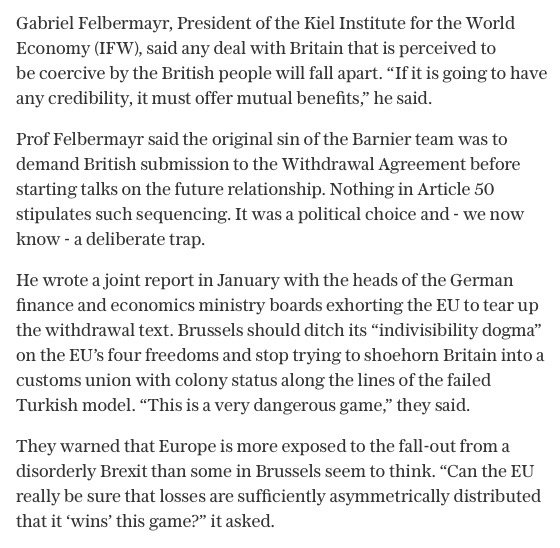Daniel Hannan: Labour senses that it will lose the next election. The EU senses it, too. So both sides have decided to lock the UK into its subordinate status, to sign “Farage-proof” agreements that future governments will struggle to unpick. …🧵 telegraph.co.uk/news/2025/07/1…
… The Telegraph has seen the texts on agriculture and energy policy that Sir Keir Starmer agreed in May. …
… No wonder the PM was reluctant to get into specifics. Britain has accepted permanent and unilateral EU control of its food and energy regulations. Worse, it is agreeing to pay for the privilege of being slapped about. …
… “Neither agreement should give the United Kingdom the right to participate in the Union’s decision-making,” the text proclaims, without diplomatic niceties. …
… “The United Kingdom should contribute financially to supporting the relevant costs associated with the Union’s work in these policy areas. This includes financial contribution to inter alia the functioning of the relevant Union agencies, systems and databases.” …
… To see how abusive the relationship is, try to picture it the other way around. Imagine a British Government insisting that trade with the EU is contingent on Brussels making financial transfers to the Treasury; …
… that disputes will be arbitrated by the Supreme Court of the United Kingdom; that Brussels must label its goods to avoid leakage into Northern Ireland; that British fishermen should have access to EU waters; …
… that the EU might be allowed to defend British interests militarily, but only if it pays for the privilege; that any change in future British regulations will automatically be shadowed on the Continent. …
… Such things are, of course, unimaginable. British Euro-fanatics maintain that this asymmetry simply reflects the difference in the size of our economies, but that is nonsense. …
… We are the sixth-largest economy in the world, for Heaven’s sake, and we are accepting terms that far smaller EU trading partners would not countenance. …
… Indeed, nowhere else in the world are trade deals dependent on the deliberate subjection of one of the contracting parties. …
… Australia and New Zealand have perhaps the most comprehensive trade agreement on the planet, but it would not occur to either side that the Kiwis should make budgetary transfers or hand over their fishing grounds as a participation fee. …
… Talking of which, New Zealand has a mutual recognition deal on agrifoods with the EU of a kind not uncommon among developed economies. …
… Each side agrees to trust the other’s regulators. If a consignment of Danish bacon is approved by local inspectors, that is good enough for the Kiwis, and vice versa. …
… There was no reason for the EU not to have a similar deal with Britain, whose food standards were not simply compatible with its own, but identical. But Eurocrats were feeling vindictive. They wanted to punish us for the referendum. …
… More than this, they fretted that, if Britain was allowed to opt out of the more unscientific and onerous Brussels regulations, it might import food from the rest of the world. …
… It might, for example, go back to buying its beef from Australia and Canada rather than Ireland and France.
So Eurocrats demanded “dynamic alignment” (an odd phrase, few things being less dynamic than the EU). …
So Eurocrats demanded “dynamic alignment” (an odd phrase, few things being less dynamic than the EU). …
… They insisted that the UK should not simply meet EU standards when selling to the EU, but should impose them domestically. And they insisted that the deal should be open-ended, so that future changes in those regulations would be automatically applied in Britain. …
… The last Government was having none of it. It was well aware of the statistics. EU food exports to the UK were worth around two to three as much as the reverse. And many British exports were in categories where safety checks did not apply: Scotch whisky, for example. …
… It was Brussels that was, in diplomatic parlance, the demandeur here. The UK buys around £40 billion of EU food each year – a quarter of everything Europe exports. We take substantially more than the US and China. …
… If Brussels wanted a New Zealand-style mutual recognition deal, said the Conservative Government, great; but the idea that Britain would invite foreign officials to regulate its domestic food standards was a non-starter. …
… Britain’s paltry asks – easier access for touring artists, equivalence for our financial services companies – were dropped during the talks. …
… The sole claimed victory – the use of e-gates for British passport holders, something the EU could have done at any time, as Britain does for EU passports – turned out not to have been agreed. …
… I suppose there is one silver lining. When, as seems inevitable, Labour’s fiscal incontinence brings a full-scale financial crisis, not even the #FBPE halfwits will be able to blame Brexit. As far as the economics goes, Brexit never happened.
• • •
Missing some Tweet in this thread? You can try to
force a refresh













